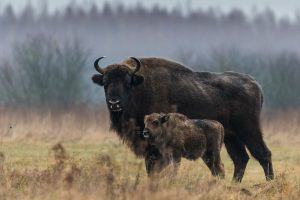| Project duration: | 2021-2025 |
|---|---|
| Project status: | Active |
| Project leader: | dr hab. Rafał Kowalczyk |
| Project co-investigators: |
dr hab. Marta Kołodziej-Sobocińska dr Tomasz Borowik mgr Barbara Marczuk mgr Tomasz Kamiński prof. Graham Kerley (Nelson Mandela University, SA) |
The refugee species concept was originally developed on European bison, being confined to suboptimal forest habitats, with consequences of decreased fitness and density, but increasing evidence shows that refugee species occur on all continents and include a diversity of animal species. Currently, a major limitation of the refugee species concept is that the understanding of the mechanisms whereby refugee species suffer lower fitness when confined to suboptimal habitats is lacking. These mechanisms could include top down (e.g. predation) or bottom up (e.g. nutritional resources) limitations. The planned project will address this problem through focussing on the influence of nutritional resources on the reproductive performance and macrophysiological indices of a number of bison populations that vary in their access to food resources, using a non-invasive approach. Differences in the habitat structure at reintroduction sites and the management practices used, the latter including varying amounts and quality of supplementary fooder provided to bison (from natural conditions without feed supplementation to intensive winter feeding), creates a well-replicated natural field experiment to test influence of diet quality on large herbivore reproductive startegies and fitness.

The project specifically aims to:
1) contrast annual pattern of diet quality in populations under natural foraging conditions and those with winter food seplementation;
2) analyse the influence of nutritional conditions on European bison fitness across multiple populations;
3) investigate reproduction parameters and breeding synchrony in populations of bison having varying access to diversified foraging resources.
The study will be conducted in free and semi-free-ranging populations of European bison and include both field and laboratory methodology. The project is a novel combination of non-invasive methodologies in order to perform advanced statistical models to study the interaction of food resources, body condition, nutritional stress and reproductive performance of European bison populations in a gradient of nutritional conditions. The project is the first such study on the largest and most unique mammal of Europe, which was a model for the development of the refugee species concept. Such species are being increasingly recognised around the world, however there is no studies on influence of nutritional resources on their performance, that may be crucial for their protection.